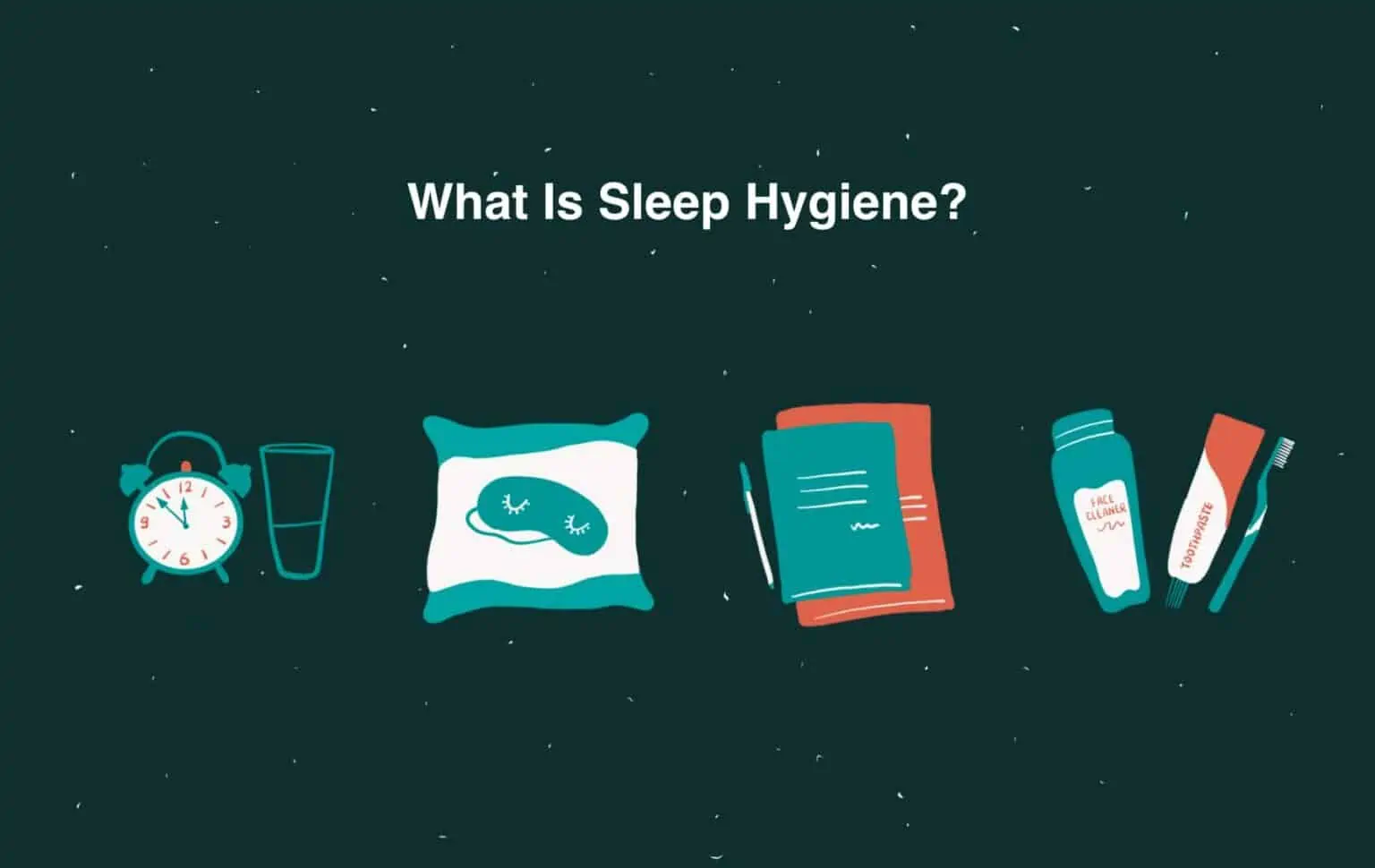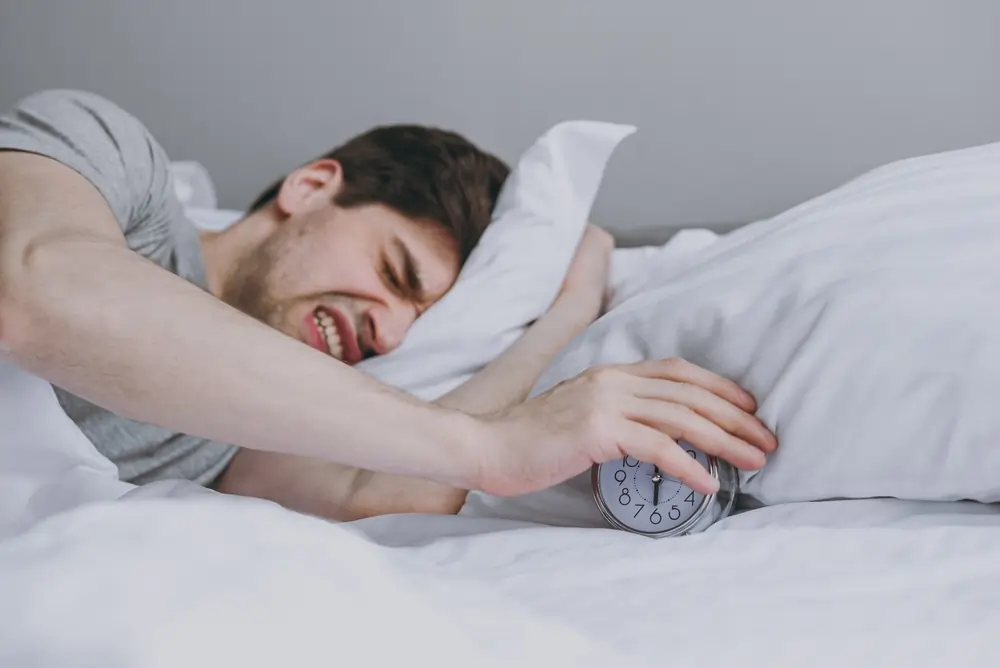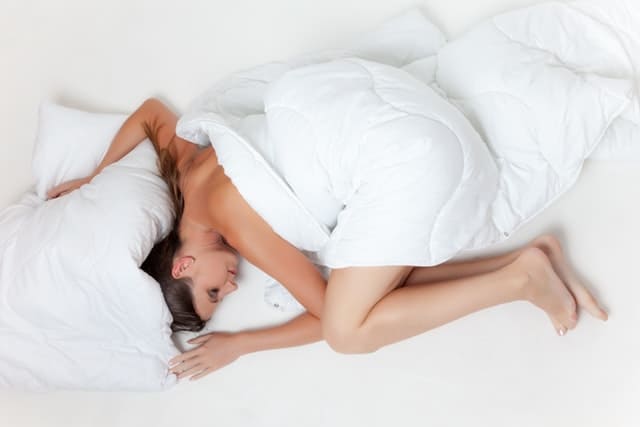8 Tips For Getting a Good Night’s Sleep When You’re Sick
Share
Fact checked
Reviewed by experts
Updated
December 15, 2022
Quick read
13 mins to read
List of Content
Sleep is a factory of 3Rs for a healthy lifestyle. It reboots, resets, and repairs the body. But, it becomes such a withering task to sleep when sick. And it could be frustrating when a person- whether an adult or a child, feels particularly tired and achy but still cannot catch a shut-eye.
However, sleep is essential to repair the body, reset the stress, and reboot all the energy; a person may need more sleep when sick than the recommended 7-8 hours of sleep. So read down further to know why do you feel sleepy when sick? What are the benefits of sleep? How to sleep when sick? And how much sleep is appropriate?
Why Do You Feel Sleepy When You're Sick
Sleeping with a fever is a chore that leaves people frustrated due to being involuntarily procrastinated. And sometimes it happens that a person tends to sleep when sick in the wrong places, feeling extremely lethargic and fatigued. But why is that? The simple answer is that human bodies do what human bodies must do in need. And it is because of the body’s immune system that forces the body to shut down.
When the body detects any pathogens or foreign bodies, it is a process in the body’s immune system that sends a signal to the molecules present in the brain. There, the molecules interact with the neurochemical systems responsible for regulating normal sleep.
Studies have revealed that the interaction between the immune system’s signaling molecule (the cytokine IL-1) and the brain’s neurochemical system (the serotonin system) gets amplified during illness or fever. Therefore, people tend to get sleepy when they are sick.
What Are the Benefits of Sleep When You're Sick
Sleep is psychology directly related to the body’s recuperative and regulative characteristics since most of the benefits of sleep when sick is related to the immune system.
The body’s functioning gets extremely alerted when bacterias or viruses attack the body. When it gets detected, the immune system starts to turn up the body temperature, which in normal terms is known as ‘being sick.’ And it is a given that sickness makes people sleepy and fatigued. However, sleep has its fair share of benefits.
- Sleeping helps the immune system to do its job in fighting off germs from the body by giving it a jump-start.
- The immune system’s molecule (cytokines IL-1) targets the infections. These molecules are produced and released quantitatively during sleep.
- The body responds better to the illness by fighting off viruses while asleep.
- Since the immune system needs the energy to fight germs, the brain directs the energy that was to be consumed during the wakefulness doing activities like reading, moving, doing chores, etc., to the immune system.
- One of the pros of sleeping is that the person will rest inside instead of going out, making them susceptible to infections.
- Also, getting sufficient sleep is essential since lack of sleep can also make people more susceptible to getting illnesses, such as sleep deprivation, depression, cardiovascular diseases, etc.
How to Sleep When Sick
Sick and can’t sleep is a situation nobody wants to be in. So follow the guide about the best way to sleep when sick. But first thing first, it may be vital to sleep when sick. However, nocturnal sleep is more beneficial and necessary for health than tiny crumbs of day naps.
Furthermore, treating symptoms of an illness individually may help make it easier to fall asleep and improve sleep quality.
The following tips can help people sleep when sick:
Sleeping With Heartburn
Heartburn is an uncomfortable and foul sensation in the chest and throat due to the backflow of stomach acids that enter the esophagus. And it has somehow become an ordinary situation in the western world.
And though it is not life-threatening, it is also considered the synonym for gastroesophageal reflux disease (GERD) since feeling heartburn twice a week can be the tell-tale symptom of GERD. Also, according to the American College of Gastroenterology, up to 20% of the US population has GERD.
And if the heartburn is infrequent, then it’s better to take precautions by,
- Avoid fatty, spicy, and greasy food such as chocolate, coffee, peppermint, pizza-burger, alcoholic beverages, etc.
- Better lose weight since abdominal fat can be triggering factors for heartburn.
- Take over-the-counter medication to relieve some discomfort from heartburn.
These precautions may help, but they complain of acid reflux and indigestion when a person lays down. Therefore it is also essential to know the best sleeping position for acid reflux.
- First off, it is vital to remember that lying down right after having a meal can trigger heartburn, so it is better to wait two or three hours after eating.
- Elevating the head at least 6-8 inches while sleeping decreases the chances of bile rising to the esophagus.
- Using an under-mattress foam wedge to elevate the head is more beneficial than a pillow because using the latter can sometimes result in a sore neck and back.
- Also, what side to lay on for heartburn is a concern because, according to the 1994 study, lying on the right side can aggravate the stomach acids. So it is better to sleep on the left side.
Sleeping While Pregnant
The women’s body goes through several changes during pregnancy. And as time moves on, it gets harder to fall asleep. In addition, finding the same level of comfort in certain positions might be a challenge.
And how much ever comfortable it may be, it becomes impossible to sleep on the stomach for obvious reasons. Therefore, in accordance with the research and conventional expert advice, the following are the cumulated tips that ensure a healthy sleeping position during pregnancy.
- Experts are absolutely against sleeping on the back in this situation. Since the entire body weight and the growing fetus is on the back, intestine, and on the vein responsible for delivering blood and nutrients to the baby. It may inhibit the proper blood flow and ensue back hips and leg pain.
- And although it is perfectly fine to sleep on the right, research suggests women sleep on their left during pregnancy because it allows maximum blood and nutrients to flow to the fetus and enhances the functioning of the kidney, which allows for better elimination of wastes and less swelling of limbs.
- Using lots of pillows or investing in a body pillow might make the sleep comfortable. Women can wedge the pillow between their legs, aligning the spine and hip. Or they can get a pregnancy pillow, which may support all the body parts that are strained and uncomfortable.
Sleeping With a Cold or Flu
The difference between cold and flu isn’t much; cold symptoms include a runny nose, congestion, sneezing, and coughing. The flu includes the aforementioned symptoms and muscle pain, headaches, fatigue, fever, and chills. However, despite these innumerable symptoms, all it takes to alleviate them is a little bit of rest, pillows, warmth, and the following tips:
- Coughing is extremely disruptive while sleeping, and if the cough is productive, coughing is with phlegm. Try taking medicines to clear it out. There are also alternatives to soothe the coughing fits, such as cough suppressants or ointments like Vicks vaporub.
- Drinking hot tea with honey eases the urge to cough.
- Stacking up a bunch of pillows to alleviate the head for easy breathing, when the head is propped up, the gravity keeps the phlegm from congesting the chest and nose.
- Drinking hot, non-alcoholic, and decaffeinated beverages like ginger tea or even a simple glass of hot water with a spoon of honey may help soothe down most of the symptoms.
- Take over-the-counter medications for cold and flu for 30 minutes to relieve the symptoms as quickly as possible.
Sleeping With Fever
Fever is the body’s way of fighting germs, where the body’s immune system turns up the heat to weaken the pathogens. However, it is important to let the fever take its course, but there are ways to feel comfortable if the temperature is high.
- For high fever (over 102°F), try over-the-counter medicines, such as ibuprofen, aspirin, or acetaminophen. Remember to take the dosages as instructed. And consult a doctor if the fever seems too high or if it lasts more than three days.
- Lower-grade fever is simply high temperature, and wearing thin pajamas and wiping down the body with a cold, wet cloth will offer relief soon, as long as it does not feel overly cold.
- Sometimes a fever can also be a flu symptom, so treat other symptoms accordingly.
- Also, avoid cold medications that include decongestants before bed; they might keep a person awake.
Sleeping With Body Aches at Bedtime
It is a tough job to sleep when sick, but if body aches accompany it, you might as well say goodbye instead of getting a good night’s sleep. And whether the body ache is from an injury, flu, or infection, they spawn evil that can make anyone uncomfortable no matter the position.
So, follow these tips to alleviate pain for better sleep.
- Taking medication such as ibuprofen can help with soreness in the body as they have anti-inflammatory properties.
- Taking a hot bath or using a hot pack for achy areas helps relieve the pain.
- And if the pain is due to fever, using a heavy blanket does the work.
- Also, sleeping in the most comfortable the body feels it will be better than forcing it to bend otherwise.
Sleeping With a Sore Throat at Bedtime
There are a few cold beverages, and that’s all it takes to feel pins and needles inside the throat. In extreme cases, even breathing and talking takes a lot of effort.
And above everything, it gets particularly difficult to fall asleep with a sore throat since it seems to intensify during bedtimes. Fortunately, easing these pains takes a few tips and a lot of warmth.
- Drinking hot lemon and honey helps in easing the soreness in the throat.
- Hot herbal tea works wonders, too, especially chamomile or ginger tea. However, any hot liquid will do as long as they aren’t caffeinated.
- If the above options aren’t available, one can simply steep the slices of ginger and lemon in hot water.
- If home remedies aren’t your thing, using medications like ibuprofen 30 minutes before bed relieves the soreness.
- Also, using a pain-numbing spray, such as Chloraseptic, to numb the pain temporarily makes it easy to fall asleep.
Sleeping With Nausea and Upset Stomach
Nausea and an upset stomach are underlying symptoms of many illnesses, such as anxiety and gastroesophageal reflux disease, or it could be because of certain medication’s side effects. However, if nausea or an upset stomach is infrequent, try the following first aid and home remedies to ease the discomfort.
- Ginger tea is the best remedy for nausea. Just boil fresh slices of ginger in the water for five minutes. Add a spoonful of honey, and drink this just before bedtime to ease nausea.
- Using hot packs over the stomach eases the discomfort quickly. However, if one does not own it, filling a cotton sock with uncooked rice and microwaving it for 30seconds to one minute can be used as the hot pack alternative.
- Prop the upper body with a bunch of pillows. This will keep the acid settled inside the stomach.
- Sleep at an incline and on the left side for stomach flu, then slowly curl in the knees towards the chest. In addition, use a hot pack while in this position. It is also one of the best positions to relieve stomach pain. However, if they get severe, contact the doctor as soon as possible.
Sleeping With a Runny or Congested Nose
It’s hard to get a night of good quality sleep when sick, and a stuffy nose is a common reason for sleep and breathing disruption. However, the urge to blow the nose can keep the person awake for longer. Furthermore, the mucus accumulated in the head can potentially give sinus headaches in the morning. Briefly know tips on the best position to sleep with a stuffy nose.
- First, prop up the head with extra pillows, or invest in an under-mattress foam wedge to elevate the head for better breathing.
- If the nose feels stuffy or congested, try clearing the airways using nasal strips and sprays.
- Turn on the humidifier; it will keep the air moist and open the nasal.
- It is better to sleep on the left side, with an elevated head. Also, a pillow between the legs, with one on the side, is the most comfortable and best sleeping position for breathing problems.
- And if the nose still feels stuffy, try breathing through your mouth. Apply lip balm to avoid the chipping of the lips while breathing.
How to Get Good Sleep
“How to fall asleep when sick?” isn’t rocket science but isn’t a piece of cake either. With sleep being the main regulator of the immune system, a person may feel sick from even sleep deprivation. When a person comes down with the flu or cold, it somehow is easier to recover by sleeping. However, it gets harder to catch some shut-eye after any illness.
And everyone at some point finds it difficult to adjust to their ever-changing life, while some are like water in their container. However, if anyone belongs to the former category, other factors must be heeded to improve better sleep quality.
Go to Bed as Early as Possible
The earlier anyone goes to sleep, the more sleep they will get. However, lazily sprawled out on the couch while Netflixing in the night suit is not going to bed early. And sticking to a strict early sleep schedule may help with better sleep hygiene.
Take Theraflu to Provide Relief
Cold and flu symptoms are conducive to sleep, and to retribute the symptoms, it is better to take the over-the-counter medication Theraflu, which can counter-attack the symptoms of cold and flu.
Because the Theraflu is a shield and the sword against the cold and flu symptoms with its right arms, such as acetaminophen, which is a pain reliever and helps in muscle pain ring the cold; Diphenhydramine HCI relieves the allergic reactions or flu symptoms that include sneezing, runny nose, itchiness, etc. These are phenylephrine HCI, dextromethorphan HBr, and guaifenesin, which relieve symptoms like nasal congestion, coughing, and clearing airways.
Unplug at Least an Hour Before Hitting the Hay
Technology and social networking may have improved the way of life, but it has also killed the nights. Using phones, scrolling, double-tapping, and browsing have kept everyone up till past midnight.
And some people use the phone with a thought, “until I get sleepy.” Here’s what happens, the blue light that emits from the screen will keep anyone awake till morning. These lights suppress the melatonin from getting produced; it is a type of hormone that signals the body to time out and sleep.
Therefore, it is better to unplug from all the devices at least one or two hours before bedtime. Instead, try cultivating a habit or hobby like reading, knitting, crocheting, journaling, etc.
Eat Light Before Bed, So You’re Not Tossing and Turning
Eating mild meals is needed during supper since the body will have so much time to digest. And since having a heavy fulfilling meal may upset the stomach or cause gateway symptoms for gastroesophageal reflux, indigestion, and heartburn.
Pros of eating early include lower blood pressure, improved sleep quality, healthy digestion, better metabolism, reduced risk of obesity, and many more.
Create an Optimal Environment for Sleeping
Whether a person is sleepy or not is secondary to nocturnal sleep time. Instead, the priority must be setting up the right environment to let the body relax.
Lit the room dimly or completely dark, with the temperature at least in the 60s, avoid using the screen, even to see time, use a heavy comforter blanket and a glass of water by the nightstand can create a perfect relaxing environment to sleep.
Use White Noise to Block Out Disruptions
White noise is a great choice to block out any outside or inner voice that may disrupt sleep. It could be any sound that calms and puts the person listening to it to sleep, like birds chirping, ocean waves, or any calm musical piece that soothes the listener.
Turn on a Humidifier
Dry air may make a person susceptible to cold and flu symptoms, such as coughing, sneezing, sore throat, etc. a humidifier can moisten up the air in the room. It also helps with congestion and promotes better sleep quality.
However, one con of the humidifier is it’s noisy, and the sound may keep you awake. So either chooses one with less noise or keep the one already owned away from the bed to minimize the sound.
Have a Soothing Drink
Soothing and caffeine-free drinks, such as herbal teas like chamomile, green, or white tea, are good stimulators of sleep; drinking warm water with lemon and honey or a clear broth might also be beneficial in promoting sleep.
Having warm drinks helps with a sore throat and symptoms of cold and flu such as coughing and nasal congestion, etc. also, try avoiding drinks that contain alcohol, caffeine, or nicotine, as these substances can disrupt sleep.,
Limit Daytime Naps
It is common to feel groggy and want to sleep when sick, even if it’s in the morning, noon, or evening. But many times, it might be just laziness or fatigue from work or school kicking in. And no matter how tempting the couch or the bed may look, try limiting the nap, as it can disrupt the nocturnal sleep.
Also, avoid napping for more than 30 minutes and close to bedtime; doing so will help the body sleep at an appropriate time.
Stick to a Regular Sleep Schedule
Early risers are healthier and happier than those who sleep in but to be an early riser that is healthy and happy, one must sleep early too. Try to sleep and wake up roughly at the same hours to build a healthy sleep cycle, and do not change it by more than an hour during the weekends.
Having a strict sleep schedule can improve the lifestyle anyone can make, plus it helps reinforce the body’s sleep-wake cycle.
Manage Your Worries and Stress
Managing stress and worries is important since they can become a hurdle and may keep anyone awake throughout the night. Jotting down worries and controlling stress by meditation, calming music, or yoga may help promote better sleep quality.
Another way to manage worry is practicing mindfulness or talking to a family member. Doing these few simple things may help ease the mind to sleep.
How Much Sleep Is Best When Sick
It is good to sleep when sick since our body needs time to repair and heal itself. So, it’s fine to feel a little tired and sleep when sick.
But, if the fever lasts for more than three days and drowsiness is still the same, then it would be better to consult a doctor. And if the illness or flu gets better, but the sleepiness isn’t going away, then too is better to consult with a doctor.
Anyhow, heed the signs of good sleep quality and poor sleep quality. Good sleep quality is when a person wakes up well rested after a proper amount of sleep, contrary to poor sleep quality, where no amount of sleep can make the fatigue disappear.
When to See a Doctor
There are high chances of getting up well after a few home remedies, good sleep, and heeding precautions. However, if the sickness isn’t gone after three to four days, there’s a high chance it could be a symptom of an underlying condition. Consult a doctor if,
- Breathing is hard
- The fever seemed to have gone but later got worse.
- Feeling pressure in the chest.
- Feeling weak and dizzy.
These could either be symptoms of any psychological issue, or an underlying condition, so an expert’s advice is needed.
Final Thoughts
It is important to sleep when sick. Even though, ironically, a person can’t sleep with fever because of the achy and pokey symptoms. However, try to sleep and if the sleep gets light in the middle of the night, get up and do whatever woke you up, blow your nose, drink water, and get back to sleep after doing whatever needs to be done.
Also, do not ever fight the urge to throw up. Vomiting is the body’s way of eliminating illness from the body. And after throwing up, clean the mouth with plain water; however, do not brush the teeth as it may damage them.
And remember, as much as a good rest is needed, a healthy diet and exercise are also the main part of a healthy lifestyle.
FAQs
When feeling nauseated, sleep high and on your side. While it makes no difference which side you sleep on, sleeping on your side can minimize your chances of choking if you vomit while sleeping.
While some people feel that leaving a window open causes their sore throat, the air quality is to blame. Cool air from an open window can help people breathe better unless the air is very dry.
Many individuals prefer to sleep in a cool environment, but it should not be so cold that you wake up shivering in the middle of the night. Consider raising the temperature slightly rather than lowering it when you’re feeling under the weather. Just remember to change it back when you feel better.
If your schedule allows, it’s better to let them sleep as much as possible. Also, when children are ill, they may wake up more frequently. This is frequently caused by discomfort from a congested head, abdominal ache, or other causes.
While being sick can make you weary, it can be difficult to sleep properly when you don’t feel well, have a stuffy nose, or have a persistent cough. In many situations, symptoms worsen later in the day, making sleep even more difficult.
This website does not offer medical advice nor professional medical services; rather, it is provided solely for educational, informational, and/or entertainment purposes. Individuals seeking medical advice should consult a licensed physician. The information provided should not be used for diagnosis or treatment of any condition, disease, or injury. When you have a medical condition, you should always talk to licensed doctor or other certified medical professional. You should never delay seeking professional medical advice or treatment based on the contents of this website. Call 911 or immediately go to the nearest emergency room if you think you may have a medical emergency. The contents of this website are provided “as-is”, Sleep Authority and its parent, subsidiaries, affiliates, employees, contributors disclaim any warranty of the information contained herein. Please contact using contact form to report any errors, omissions, misinformation, or abuse.
Sleep Authority is brought to you by Resident, the company that brings you Nectar, DreamCloud, Awara, Wovenly, Bundle, Home Well Designed and Level Sleep.








